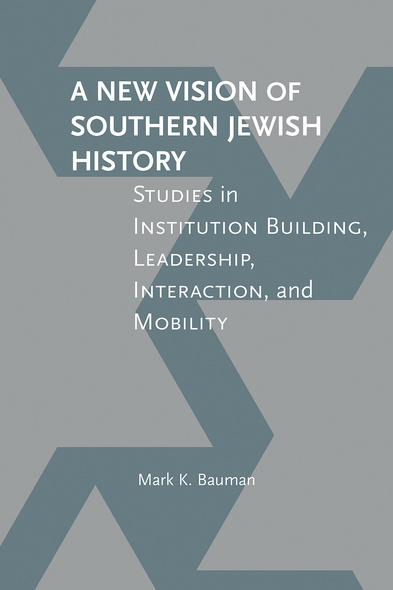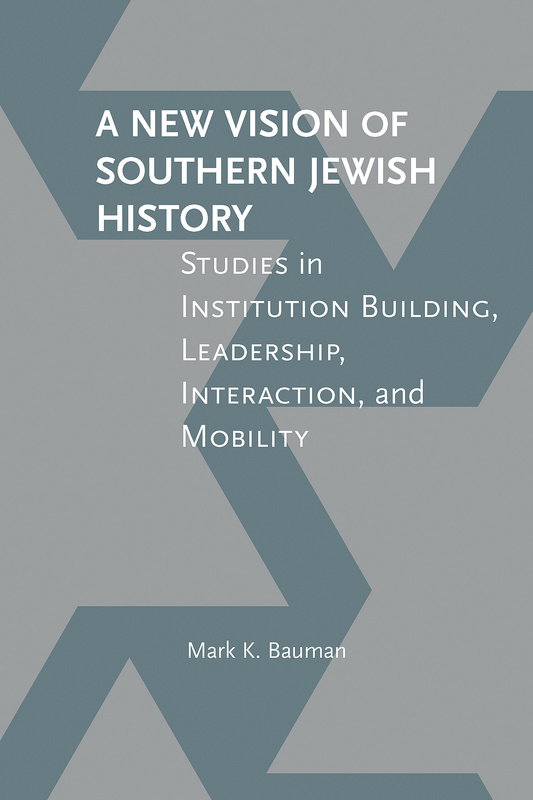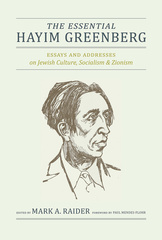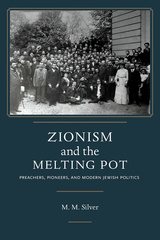A New Vision of Southern Jewish History
Studies in Institution Building, Leadership, Interaction, and Mobility
Essays from a prolific career that challenge and overturn traditional narratives of southern Jewish history
Mark K. Bauman, one of the foremost scholars of southern Jewish history working today, has spent much of his career, as he puts it, “rewriting southern Jewish history” in ways that its earliest historians could not have envisioned or anticipated, and doing so by specifically targeting themes and trends that might not have been readily apparent to those scholars. A New Vision of Southern Jewish History: Studies in Institution Building, Leadership, Interaction, and Mobility features essays collected from over a forty-year career, including a never-before-published article.
The prevailing narrative in southern Jewish history tends to emphasize the role of immigrant Jews as merchants in small southern towns and their subsequent struggles and successes in making a place for themselves in the fabric of those communities. Bauman offers assessments that go far beyond these simplified frameworks and draws upon varieties of subject matter, time periods, locations, tools, and perspectives over three decades of writing and scholarship.
A New Vision of Southern Jewish History contains Bauman’s studies of Jewish urbanization, acculturation and migration, intra- and inter-group relations, economics and business, government, civic affairs, transnational diplomacy, social services, and gender—all complicating traditional notions of southern Jewish identity. Drawing on role theory as informed by sociology, psychology, demographics, and the nature and dynamics of leadership, Bauman traverses a broad swath—often urban—of the southern landscape, from Savannah, Charleston, and Baltimore through Atlanta, New Orleans, Galveston, and beyond the country to Europe and Israel.
Bauman’s retrospective volume gives readers the opportunity to review a lifetime of work in a single publication as well as peruse newly penned introductions to his essays. The book also features an “Additional Readings” section designed to update the historiography in the essays.
Bauman has, unlike nearly everyone else who has written in southern Jewish history, provided a scholarly perspective that goes beyond descriptive and, for lack of a better term ‘cute’ stories about the oddities of Jewish life.’
—Hasia R. Diner, author of We Remember with Reverence and Love: American Jews and the Myth of Silence after the Holocaust, 1945–1962 and The Jews of the United States, 1654 to 2000
Acknowledgments
Foreword by Ronald H. Bayor
Introduction
Part I. Community and Institution Building
Chapter 1. Variations on the Mortara Case in Mid-Nineteenth-Century New Orleans
Chapter 2. Centripetal and Centrifugal Forces Facing the People of Many Communities: Atlanta Jews from the Leo Frank Case to the Great Depression
Chapter 3. The Emergence of Jewish Social Service Agencies in Atlanta
Chapter 4. The Transformation of Jewish Social Services in Atlanta, 1928–1948
Chapter 5. Southern Jewish Women and Their Social Service Organizations
Part II. Lay Leadership
Chapter 6. Factionalism and Ethnic Politics in Atlanta: German Jews from the Civil War through the Progressive Era
Chapter 7. Victor H. Kriegshaber: Community Builder
Chapter 8. Role Theory and History: The Illustration of Ethnic Brokerage in the Atlanta Jewish Community in an Era of Transition and Conflict
Chapter 9. The Youthful Musings of a Jewish Community Activist: Josephine Joel Heyman
Part III. Rabbinical Leadership
Chapter 10. Demographics, Anti-Rabbanism, and Freedom of Choice: The Origins and Principles of Reform at Baltimore’s Har Sinai Verein
Chapter 11. The Rabbi as Ethnic Broker: The Case of David Marx. Cowritten with Arnold Shankman
Chapter 12. Harry H. Epstein and the Adaptation of Second-Generation Eastern European Jews in Atlanta
Part IV. International Leadership
Chapter 13. Beyond the Parochial Image of Southern Jewry: Studies in National and International Leadership and Interactive Mechanisms
Chapter 14. The Blaustein–Ben-Gurion Agreement: A Milestone in Israel-Diaspora Relations
Part V. Historiography and Synthesis
Chapter 15. The Southerner as American: Jewish Style
Chapter 16. The Flowering of Interest in Southern Jewish History and Its Integration into Mainstream History
Chapter 17. A Multithematic Approach to Southern Jewish History
Chapter 18. A Century of Southern Jewish Historiography
Notes
Additional Readings
Mark K. Bauman’s Publications on American Jewish History
Index










